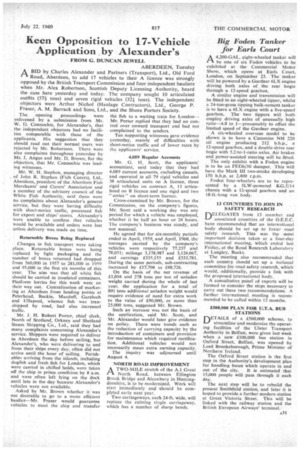Keen Opposition to 17-Vehic1e Big Foden Tanker
Page 33

If you've noticed an error in this article please click here to report it so we can fix it.
Application by Alexander's
FROM G. DUNCAN JEWELL
ABERDEEN, Tuesday A BID by Charles Alexander and Partners (Transport), Ltd., Old Ford r-k Road, Aberdeen, to add 17 vehicles to their A licence was strongly opposed by the British Transport Commission and four independent hauliers when Mr. Alex Robertson, Scottish Deputy Licensing Authority, heard the case here yesterday and today. The company sought 10 articulated outfits (573tons) and seven rigid vehicles (324 tons)'. The independent objectors were Arthur Nichol (Haulage Contractors), Ltd., George P. Fraser, A. M. Barrack and Sons, Ltd., and the Shore Porters Society.
The opening proceedings were enlivened by a submission from Mr. W. D. Connochie, for Alexander's, that the independent objectors had no facilities comparable with those of the applicants. His suggestion that, they should read out their normal users was rejected by Mr. Robertson. There were also complaints throughout yesterday by Mr. J. Angus and Mr. D. Brown, for the objectors, that Mr. Connoehie was leading witnesses.
Mr. W. H. Stephen, managing director of John R. Stephen (Fish Curers), Ltd., Aberdeen, president of the Aberdeen Fish Merchants and Curers' Association and a member of the advisory council of the White Fish Authority, said there were no complaints about Alexander's general service, but they were having difficulty with short-notice traffic, processed fish for export and ships' stores. Alexander's were unable to confirm that vehicles would be available and orders were lost unless delivery was made on time.
Returnable Boxes Being Replaced Changes in fish transport were taking place. Returnable boxes were being replaced by light packaging and the number of boxes returned had dropped from 560,000 in 1957 to 281,000 in 1959 and 95,000 in the first six months of this year. The aim was that all white fish should be carried in insulated containers. Platform lorries for this work were on their way out. Centralization of marketing at Aberdeen from landing points at Peterhead, Buckie, Macduff, Gareloch and Ultapool, whence fish was transhipped by road, had also increased traffic.
Mr. J. H. Robert Porter, chief clerk, North of Scotland. Orkney and Shetland Steam Shipping Co., Ltd., said they had many complaints concerning Alexander's service. Shippers were required to deliver to Aberdeen the day before sailing, but Alexander's, who were delivering to and from their ships every day, often did not arrive until the hour of sailing. Perishables arriving from the islands, including dogfish and fresh fish for London, which were carried in chilled holds, were taken off the ship in prime condition by 8 a.m. and were often left lying on the dock until late in the day because Alexander's vehicles were not available.
Asked by Mr. Brown whether it was not desirable to go to a more efficient haulier—Mr. Fraser would guarantee vehicles to meet the ship and transfer the fish to a waiting train for London'— Mr. Porter replied that they had no control over onward transport and had not complained to the senders.
Ten supporting witnesses gave evidence yesterday, mainly of difficulties with short-notice traffic and of lower rates by the applicants' service, 4,089 Regular Accounts Mr. G. II. Scott, the applicants' accountant, said today that they had 4,089 current accounts, excluding casuals, and operated in all 79 rigid vehicles and 38 articulated units on A licence, three rigid vehicles on contract A, 11 articulated on B licence and one rigid and two " artics " on short-term licence.
Cross-examined by Mr. Brown, for the Commission, on the company's figures, Mr. Scott said a working day was any period for which a vehicle was employed, whether it be half an hour or 24 hours. The company's business was steady, and not seasonal.
He agreed that for six-monthly periods ended in April, 1959, and April, 1960, the tonnages carried by the company's vehicles were respectively 77,237 and 78,051; mileage 3,178,987 and 3,124,067, and earnings £335,155 and £333,781. During the same periods, sub-contracting increased by £17,704 to £48,726.
On the basis of the net revenue of £1,016 and 278 tons per ton of unladen weight carried during the whole of last year, the application for a total of 894 tons additional unladen weight would require evidence of need for extra work to the value of 190,000, or more than 25,000 tons, suggested Mr. Brown.
Such an increase was not the basis of the application, said Mr. Scott, and Mr. Alexander would later give evidence on policy. There were trends such as the reduction of carrying capacity by the introduction of containers and provision for maintenance which required rectification. Additional vehicles would not necessarily mean extra earning capacity.
The inquiry was adjourned until August 4.
NORTH ROAD IMPROVEMENT
ATWO-MILE stretch of the A.1 Great North Road. between Ellington Brook Bridge and Alconbury in Huntingdonshire, is to be modernized. Work will start immediately and 'should be completed early next year.
Two carriageways, each 24-ft. wide, will replace the existing single carriageway, which has a number of sharp bends.




































































































